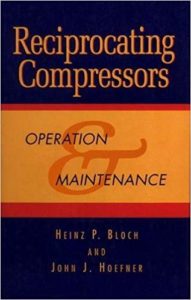Reciprocating Compressors Operation and Maintenance
Reciprocating Compressors Operation and Maintenance
Reciprocating Compressors Operation and Maintenance discussing the types of compressors and how they work, it will be helpful to consider some of the basic gas laws and the manner in which they affect compressors. By definition, a gas is a fluid having neither independent shape nor form, which tends to expand indefinitely.Gases may be composed of only one specific gas maintaining its own identity in the gas mixture. Air, for example, is a mixture of several gases, primarily nitrogen (78% by volume), oxygen (21%), argon (about 1%), and some water vapor. Air may also, due to local conditions, contain varying small percentages of industrial gases not normally a part of air.
The purpose of compressors is to move air and other gases from place to place. Gases, unlike liquids, are compressible and require compression devices, which although similar to pumps, operate on somewhat different principles. Compressors, blowers, and fans are such compression devices.
You can also Read Modern Boiler Types and Applications
Reciprocating Compressors Operation and Maintenance
- ACKNOWLEDGMENTS
![Reciprocating Compressors]()
- PREFACE
- RECIPROCATING COMPRESSORS AND THEIR APPLICATIONS
- DESIGN AND MATERIALS FOR RECIPROCATING COMPRESSOR COMPONENTS
- OPERATION AND MAINTENANCE OF RECIPROCATING COMPRESSORS
- OVERHAUL AND REPAIR OF RECIPROCATING COMPRESSORS
- TROUBLESHOOTING COMPRESSOR PROBLEMS
- PREVENTIVE MAINTENANCE FOR RECIPROCATING COMPRESSORS
- SAFETY IN OPERATION AND MAINTENANCE
- APPENDIX: RECIPROCATING COMPRESSOR CALCULATIONS
- INDEX
To understand how gases and gas mixtures behave, it is necessary to recognize that gases consist of individual molecules of the various gas components, widely separated compared to their size. These molecules are always traveling at high speed; they strike against the walls of the enclosing vessel and produce what we know as pressure.
Temperature affects average molecule speed. When heat is added to a fixed volume of gas, the molecules travel faster, and hit the containing walls of the vessel more often and with greater force. See Figure 1-2. This then produces a greater pressure.


Comments are closed.